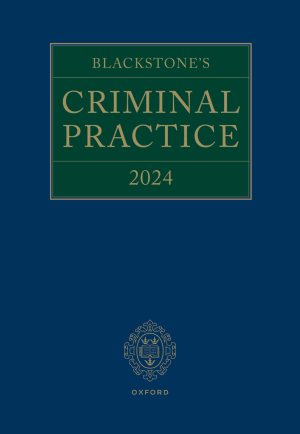Blackstone's Criminal Practice 2024 (Book, 3 Supplements & eBook Pack)
ISBN13: 9780198892489
Published: October 2023
Publisher: Oxford University Press
Country of Publication: UK
Format: Hardback, 3 Supplements + eBook
Price: Out of print
Led by Professor David Ormerod CBE, KC (Hon) and David Perry KC, Blackstone's Criminal Practice brings together an expert team of authors with a commitment to deliver a work which offers detailed and insightful coverage for criminal practice and authoritative statements of the law in a practical and accessible format. With an accompanying supplement containing essential primary materials and commentary updates throughout the year, and access to regular web updates and the additional analysis provided by Blackstone's Briefings, you can rely on Blackstone's Criminal Practice to be your constant companion.
The 2024 edition has been meticulously revised to provide extensive coverage of all new legislation, case law, Sentencing Guidelines, and the Criminal Procedure Rules 2020, and the Criminal Practice Directions 2023.
Supplement 1 is included with this pack. Two further cumulative supplements, published in early and mid-2024, will provide updated commentary and analysis as well as the latest updates to the Criminal Procedure Rules and Practice Directions, and the main PACE codes and other guidelines.
The eBook access included with this version is provided on OUP LawReader, offering instant online and offline access, full text searching, extensive links from citations to judgements on BAILII and ICLR, and tools to annotate, highlight and print content. Use OUP LawReader to create your own links to Blackstone's content in the eBook edition and share them, or embed them in other documents, with just a few clicks.
New to this edition
- Legislative developments including the Public Order Act 2023, the National Security Act 2023, and the Illegal Migration Act 2023, as well as the Criminal Practice Directions 2023
- Coverage of key cases in Part A (Criminal Law) includes In re Abortion Services (Safe Access Zones) (Northern Ireland) Bill in the Supreme Court and A-G's Ref (No. 1 of 2022) on protest and proportionality; Andrews v Chief Constable of Suffolk on attempts; Datson on mistake; and Bowskill on kidnapping
- Updates on offences in Part B (Offences) and Part C (Road Traffic Offences) include Callaghan on consumer fraud; Traditional Financial Services Ltd v Bilta (UK) Ltd on corporate control; DPP v Bailey on aggravated trespass; Lam and Miller on confiscation orders; BXR, AFU, BTE, AAC and BRP on the Modern Slavery Act 2015; Mohamed on the Immigration Act 1971; and Holder on dangerous driving
- The latest updates on Part D (Procedure) include DE v Chief Constable of West Midlands Police on arrest; Musharraf on reporting restrictions; R (Hussain) v Leeds Crown Court on bail conditions imposed in the Crown Court; AUH on local authorities' powers to prosecute; Saunders v Bristol Magistrates' Court on adjourning summary trials; NJ on guilty pleas of unrepresented defendants and Nguyen on custodial sentences in such cases; APJ on jury notes; and BH v Norwich Youth Court on youth court trials
- Cases covered in Part E (Sentencing) include Dixon on dangerous offenders; Ahmed on sentencing adults for childhood offences; ZA on youth sentencing; DPP v Charlesworth and Kish on SHPOs; Cook on sentencing for non-fatal strangulation; Harty on restraining orders; Bowser on deprivation orders; Coates on community orders; Soto on sentencing under a new maximum penalty; Ali (Arie) on prison conditions and sentence; Simpson v Secretary of State on parole; Cowell on suspended custodial sentences
- Updated case coverage in Part F (Evidence) includes Pike on evidence of previous false complaints; Gold on CCTV evidence at trial; Andrews, Olive, Portman, Heslop on bad character; Kadir on the use of WhatsApp to receive evidence; Dirieon confessions; Ulas on identification from CCTV
- The supplement packaged with the main work includes the Criminal Procedure Rules 2020 (as amended and in force from 2 October 2023) and the Criminal Practice Directions 2023 (in force from 29 May 2023)
- New members on the advisory editorial board: The Hon Mrs Justice Bobbie Cheema-Grubb, LJJ Andrew Edis, HHJ Andrew Hatton, HHJ Patricia Lees, HHJ Rajeev Shetty, HHJ Rebecca Trowler, Eleanor Laws KC, Tom Little KC, Richard Swallow
